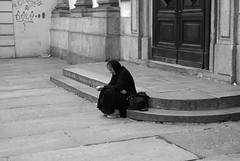RFP Staff
♦Since we printed the Wall Street 24/7 report about a week ago naming Salisbury, N.C. as the 5th ranked city in the U.S.A. suffering from soaring poverty, more media attention on this subject emerged. Charlotte TV provided coverage yesteerday. The Wall Street 24/7 Report is a report based on figures culled from the census statistics. The other day Yahoo reprinted the Wall Street 24/7 study and it was read by many millions across the country and in Canada:
http://homes.yahoo.com/news/cities-where-poverty-is-soaring-235610513.html
Salisbury was branded in the Yahoo article as a small city in major decline. Should it be? Yes. Salisbury posesses many poor neighborhoods. Think of Long Street, Horah Street, the trailer parks out by Airport Road and the city’s many housing developments and section 8 units. Undeniable poverty. Hidden poverty among seniors, undocumented immigrants, and the disabled–most of whom subsist on entitlements. 62% of children in Salisbury are on school lunch programs. Anyone who tours Salisbury can see the steep falloff between the haves and have not neighborhoods. Right now the have nots are rapidly increasing.
One thing about poverty when it reaches a critical mass–it seldom if recedes. To date “wars on poverty” have proven futile both in cities and in Appalachia. Most times people, who can afford to do so, move away from troubled cities. This compounds the situation and makes poverty grow. Businesses die, better housing gets swallowed up by rentals and apartments, and formerly affluent neighborhoods breakdown. This is what happened to cities like Detroit and Newark. Throwing entitlements and “affordable housing” at chronic poverty appears to inflame the problem.
Recruiting businesses and keeping businesses becomes harder and harder. Businesses look at an areas spendable income, education, crime, poverty, and the signatures of urban flight. Salisbury’s resume shows high crime, poor public education, soaring poverty, and most definitely urban flight.
A grim truth about poverty is this: Large numbers of poor, termed the ”permanent poor”, are unemployable even if jobs were available. Many poor persons in Salisbury are unemployable due to these reasons:
• They fail a criminal background check.
• They never graduated from high school or were early drop outs.
• They lack job skills, have no work record or a spotty one.
• They may be illiterate or lack fluency in English.
• They may lack proper grooming and rudimentary social skills.
• They may be undocumented immigrants
• They suffer from drug and alcohol abuse.
• They may be disabled or aged.
For the chronically unemployable the promise of jobs is meaningless. The driving force behind soaring poverty in Salisbury or anywhere else is a city’s critical mass of chronically unemployable. Salisbury has many who fit this category. These people seldom show up in unemployment statistics.
Keep in mind that many of those few jobs showing up in Salisbury, are taken by people living out in the county or beyond it.
One thing Salisbury is noted for is glossing over or covering up any information putting the city in a bad light. They do this with Fibrant. They bury bad news about their poorly performing public school system with meaningless award ceremonies and even go as far to spend large sums of money on IPADs that get salted away in warehouses so the school gets an award for technology. The state’s READY report composite scores show large challenges in the school system. They gloss over the crime here even though the FBI crime stats clearly show we are high achievers in violent and property crime. Just yesterday the three young men who robbed a train in Salisbury a year ago plead guilty in Federal court without mention of it in the local paper. When anything bad surfaces about Salisbury you can always count on the deniers coming out of the woodwork. Nothing bad happens in Salisbury. Everything is fantastic. “Oh they’re just playing with the numbers. They’re Salisbury haters.”
Salisbury is a dying city. If people want to turn it around, they need to pay attention to reality’s feedback–not suppress it.

